- Home
- Adam Thorpe
Pieces of Light Page 2
Pieces of Light Read online
Page 2
I thought hard for a bit, while Quiri unwrapped the iron cross from its creeper.
‘And Mr Hargreaves?’ I asked in the end, not really understanding this business with the rifle and Gil am Northc whistling for someone. ‘He done himself RIP, too?’
Quiri shrugged. ‘He done kill the hairy man,’ he said. ‘Hairy man done come back an’ kill um. Pax. Fair dos. Rain stop play.’
He laughed like a drain for a moment, clapping his hands. I knew that this was not a merry laugh, but something he would do when he wanted to clear himself out of bad things. But when I started doing the same, I was ticked off.
Then he put his hands on my shoulders and told me never ever to tell my parents that he had told me anything at all about Mr Hargreaves.
‘Why not?’ I asked.
He said he would have to leave, and never come back, because they would be very cross with him. The thought of Quiri leaving filled me with horror. I had never thought that he could leave.
There was a long list typed out by my father, a copy pinned to the door of each room, with DO NOT doubly underlined at the top. The Reverend Tarbuck called it ‘The DO’s Catechism’. First was Forget Your Quinine, then Paddle In the River, then Touch Any Snake, then Go Into the Forest Unaccompanied, then Drink or Wash Greens or Face or Hands in Unboiled Water, then Fail to Treat Any Bite or Wound, then Insult or Swear at or Hit a Servant or Any Other Native for No Just Reason. Now I headed it in my mind with Ask Mother and Father about Mr Hargreaves.
I couldn’t understand why, if everything was so dangerous, I couldn’t carry around my fetishes as Quiri and the others did. They believed in God, it seemed. At least, they joined in Morning Prayers every Sunday, and were given pieces of bread by the Reverend Tarbuck whenever he passed by, and sang in big voices under the cloth fan that Good Boy Hippolytus, our blind and crook-backed punkah-wallah, would pull vigorously in rhythm, humming along, and said that they weren’t worthy to gather up the crumbs under Thy table (a line which always made me feel hungry). Yet they also protected themselves with feathers and teeth and bone and pebbles and twisty bits of wood and flattened sardine tins and broken glass wrapped up in grass and Reckitt’s Blue wrapped up in leaves and Ovaltine labels smeared with engine oil from the Bean. As for me, I had to go about naked (though clothed uncomfortably from the top down in clothes Baluti never rinsed properly, so they gave me a rash), with only Jesus Christ Our Lord around me. He was less visible than the thinnest mist. He was also inside me, like my evening cocoa, but He didn’t taste of anything.
I took to cutting out pages from the big Bible and rolling them up in palm leaves, and sticking them in my pockets.
‘What do other children do?’ I asked, when this was discovered.
We were on the veranda. My mother smiled, rocking in her chair and gazing at the view of our ‘bay’, with its curtains of forest. ‘Certain Christians called Catholics carry rosary beads, others a crucifix. But there aren’t any other children in equatorial Africa,’ she said. ‘Not white children.’
I frowned, but didn’t say anything. I wanted her to finish.
‘You are,’ she went on, ‘the only white child in the whole of West and Central Africa, that I know of.’
She didn’t look at me when she said this, but this was normal. She often stared at a point a little bit in front of me when she was speaking to me. If I moved into this point, her stare would somehow move too, like your shadow did. If your shadow didn’t, it meant you were dead.
I leaned against her legs and looked out at the river. I loved the smell of her white dresses, usually: the smell of newly washed clothes and the perfume that the ironing made. But now it held me like a dungeon. I wasn’t like anyone else in the known world. This world went one way to the sea, because we visited the Allinsons in Victoria once or twice a year. We stayed in their big cream house next to the Botanical Gardens, rode in their old and smelly hansom cab there or around the town, played on the beach (oh, happiness!), or spent the day up in chilly Buea with its special flowers called roses. The known world the other way stopped at Odoomi: beyond was a for ever and ever of unknown forest rising higher and higher to the sky. Father had said that one day he would take me into there, to swim in the crater lake he had come across on tour. It was not far after the village.
That night I experimented with cinders from the stove, rubbing them into my face. Then I tried my father’s blacking, the stuff he brushed briskly but thoroughly into his mosquito boots twice a week.
‘What have you been doing, Hugh?’ said my mother. ‘Go and wash your face. No, wait, I’ll do it for you.’
She never trusted me, when it came to water. Anyway, both the cinders and the boot-black bothered my skin, and sweat made white streaks. I was a maggot, an albino, an outcast. The books I looked at were full of ugly little princes like myself, with thin lips and sharp noses, who were bossy and very white. That was England. I looked in the Chambers Dictionary again: ‘Presentment of Englishry, the offering of proof that a person murdered belonged to the English race, to escape the fine levied on the hundred or township for the murder of a Norman.’ I couldn’t understand this. My father came into the room (his office). He was pleased to see me reading his old dictionary.
‘My uncle gave me that,’ he said. ‘Great-uncle James, who I’m named after.’
‘Is he dead?’
‘Yes.’
‘Is he the same as Uncle Edward?’
‘No. Uncle Edward’s very much alive. He’s your mother’s brother. He lives in a lovely big house with a big soft lawn to play on –’
I was bored hearing about this house and its lawn. My parents brought it up at the slightest excuse.
‘What does dat mean?’ I interrupted, pointing at the page.
‘That, not dat, Hugh. Show me.’
He read it twice, then explained. So, already, the Normans were more important. The person who ordered about the person who ordered my father about must be a Norman. Normans were the ones who said you couldn’t have a fetish. Normans invaded, like leopards, like tsetse flies, like snakes. They had metal helmets with noses, and cruel smiles. I began to be convinced that Normans were in the forest, waiting to murder those of the English race, then put the blame on the English race. I was one of the English race.
Not long afterwards, exploring the North Pole in the horribly airless attic under the boiling-hot corrugated roof, where unwanted things were stored, I found some paintings. These were propped in the corner, and the string that tied them broke at the first tug. They were frightening pictures: they were pictures of Normans, coming out of the forest. On the back of some of them was chalked Sir Steggie, and on others someone had stuck a slip of paper typed J. S. Hargreaves, Property Of. I bundled them back and scrambled out as quickly as I could, no longer exploring the source of our great river beyond the Lord’s bosom, but just wanting a biscuit and a glass of lemonade.
From then on I hardly went into the cemetery, except with my mother after the clean-ups, and Quiri never wanted to take me there. Mr Hargreaves floated backwards into a mist of gloomy thoughts where Gil am Northc whistled for him with his fingers. The German traders were somewhere there, too, but with iron rods for hands and bare little plaques instead of faces. The cemetery was not exactly their permanent camp; that was situated somewhere I couldn’t quite place. On certain nights they would all gather there. It was a ceremonial meeting place like the ceremonial meeting places in different spots in the forest (my father told us about these), and everything in it was sacred to them. I knew they were there because the beautiful-bird-smaller-than-its-tail calling my name would go silent, and I could hear the mutterings of their plots and plans over the sounds of the river and the forest. It wasn’t the same as the mutterings of the servants around the fire, because the servants were asleep and even Big Baldie (who was also our night-watchman) lay curled up beside his bow and arrows.
Anyway, ordinary weapons were useless against such spirits; their badness crept easily past ev
en my father’s Winchesters. But they never invaded, not while I was there. When Quiri had to go away, back to his village for a funeral, for a few days, I persuaded him to give me his tooth fetish. We walked up to a point past the gorilla spirit’s place, and then he handed it over with a stern look.
‘You no go lose um, small-small chap,’ he’d say. ‘You go lose um, we go have our heads bashed to bit.’
He told me to listen out for his powerful wolf-whistle in four days’ time: I would have to go to him on the path with the tooth. If I didn’t, he would be stuck. I handed over the little picture of Jesus, about the size of a large stamp, that my parents had given me after finding the Bible’s pages torn out. It was stuck on thick card, and I kept it under my hat. My sweaty skull had rubbed and blackened the picture of Jesus so that you couldn’t really see it was Him any more, but Quiri hugged me anyway, he was so pleased.
He was worried about the way a couple of sticks were lying on the path a little further up. I couldn’t see anything wrong, but then I didn’t know much about evil spirits and their tricks. He spent quite a few minutes studying them, and then walked off down the track with a wave. I was secretly terrified that he would never come back – that he would be eaten by a leopard, or bashed on the head by a gorilla. He’d told me that he was well protected for the forest, but he and I knew that strange things happened; dizziness sometimes came into your head and there was a laugh and it was death coming in as well. There was a spirit that sat in the tree with bloody eyes and long hair and his legs dangled down as long as the longest creeper. Even if he was sitting as high as the highest birds his feet would still touch the ground. If you walked into his legs, they wrapped around you like a snake and carried you up to that horrible mouth.
I watched Quiri run soundlessly away with tears in my eyes, then I hurried back, looking straight ahead. The problem with the sticks had frightened me. Bad ju-ju, perhaps. That day, the forest didn’t really welcome me.
At this time I still had what my mother called an ayah: she came from the Baptist Mission Station run by the Reverend Tarbuck, on the mouth of the river. Her name was Mosea, and I had never not known her. She always dressed like the Ikasa market women, in bright patterns wrapped around her body and hanging over her shoulders; there was more cloth piled up on her head, like a big turban. But on Sundays she would change into a stiff white skirt and shirt to lead the hymn singing in the sitting-room. I didn’t like the Sunday Morning Prayers: I was always put between Mosea and my mother, banging away on the upright piano, and was deafened. The piano was untuneable, despite being looked at for a whole day by one of Tarbuck’s cadets. The humidity did something to the wires, and several notes just made a clunking sound. Things were better for me now because I had grown big enough to replace Ndala: his job was to reach into the piano and unstick the hammers that stuck. You had to do it very quickly, and not get your hand in the way of any other hammers that were flying up. I started doing this, standing on a stool, soon after my fifth birthday.
Mosea said something bad about Quiri and he and I couldn’t walk together any more. I liked Quiri more than I liked Mosea, because Mosea hung around me a lot of the time looking as if she had swallowed a lot of Baluti’s grey lye, which he made out of the ashes from the yard’s fire. I reckoned she swallowed this lye to keep her Sunday skirt and shirt as white as possible. She told me a bit about Jesus, and one day she said that she was called Mosea because she was found in a basket floating in the river. I asked my mother about this and my mother said it was true, because some German soldiers had killed everyone else and thrown the children into the river in baskets, like kittens.
This didn’t make me like her any more, though. Because of what she’d said about Quiri, I started to make charms against her. I wrote nasty things on scraps of paper and buried them in the earth outside her door. I scattered ash and a few homemade plant potions under her bed while she was in the toilet. There were lots of Sunday School pictures in her room: St Francis with the birds, Jesus among the children or addressing the fishermen of Galilee, Adam and Eve in the Botanical Gardens at Victoria, all coloured badly and covered in spots of mould. A rainstorm washed all the curses into view soon after – but the ink had run, which was why they hadn’t worked. The crippling ash potion was swept up into a dustpan. Her hair did not drop out, her toes did not drop off, she did not find her tongue wrapped round her little finger, she did not get so fat she couldn’t fit through the door, and no crocodile waddled up at night to make a meal of her.
Instead, I found Quiri squeezing her to death behind the chop-shed, like a gorilla or a snake can do. Then I saw his shy smile, and her frown, and was told by her to go and play with my bricks. I ran to my mother, almost in tears.
‘Quiri and Mosea are going to get married!’ I cried. My mother was wrapping a bandage around a young boy’s infected leg: the smell of creosote and sweat and bad flesh filled her ‘hospital’ so much I stayed by the hut’s door. She looked up and smiled, a fly on her cheek.
‘No wonder they wanted you out of the way,’ she said.
The young boy’s mother, or maybe grandmother, laughed and hit her head. She had big breasts as flat as my father’s jacket lapels. She couldn’t have understood, because none of the villagers except their Chief knew more than a piece of pidgin. I ran back to my room and wept.
They didn’t get married, after all. But Quiri was a little far off from me after that, and seemed to swagger about. He usually went bare-chested, and he had often made the muscles under his breasts jig up and down, to make me laugh. Now they seemed to roll like the river did sometimes, when something monstrous called the Big Beef passed, pushing out a wake that slapped at the new jetty on its concrete pillars. My father said that it was probably an effect of currents, but when Quiri slowly rolled his muscles up to his neck-bone in the weeks after he’d hugged Mosea, I couldn’t help thinking of the Big Beef, and its waves disappearing under the jetty.
My parents soon forgot about Quiri’s bad influence. I liked to press my pink hand to his chest, and feel my fingers moved one after the other by the iron rods of his muscle.
‘Are you old, now?’ I asked.
He smiled, showing his crooked front teeth. They always had a grain stuck between them, that he would flick with his tongue.
‘Hey, small-small chap, you done be cheeky, heh?’
He lifted me up wriggling in the air, and did a bounce-bounce. I flew up and down, each time landing in his huge hands. We were near the cemetery, and I scampered up to its broken iron gates and stuck my tongue out at him through the bars, wiggling my ears.
‘Mr Hargreaves, he go coming for get you,’ I yelled.
Just at that moment a bird crashed out of the bushes next to me and I hid my eyes. Then I pulled my canvas hat over my face for extra covering. Quiri came up, laughing.
‘Massa Hargreaves, ’e no go worry me atall,’ he said.
He was holding something in his shorts’ pocket, I could see that. I snatched at his wrist and pulled and the hand came out because he wasn’t ready for me. The thing fell into the soft undergrowth. It was a fob-watch like my father’s old one, but with no glass and only one hand. He cuffed my head and picked the watch up. We examined it together. He told me that it had been the property of Mr Hargreaves.
‘Did he done give um for you?’
Quiri shook his head. ‘In his bones,’ he said. ‘Tick-tock, like dis heart. But heart done be broke. He done be a dead chap, long-long time. End of over.’
‘You took um from Mr Hargreaves when he done be dead?’
Quiri nodded and pulled a face. ‘No fine for telling time,’ he murmured.
He put it back in his pocket.
‘Is dat ting for protecting you, or for go getting power from dat dead man?’ I asked.
He didn’t reply. His glistening face was thoughtful for a while, so I copied him. The sun beat up off the ground and filled my head while I sat on my heels, as Quiri was doing; I felt as if my head and my feet were f
rom two separate bodies. I shivered. The two separate parts of me were now joined by a coldness, like the butter floating in the water jars. I blinked and felt my head growing longer. Quiri seemed to be making me fly through the air again; in fact, he was carrying me. I was either very hot or very cold. My mother’s voice and face stuck up both very near and very far away, like the enormous head of a pin. I was in bed, shivering all over, with my head bashed to bits. Then I was melting into pure wetness. My mother’s voice and hand soothed me, my father boomed, things rattled and tick-tocked. Of course it was the fob-watch that had possessed me: I saw it, at one point, coming up through the floor as if the floor was liquid. It was huge, and the hand was spinning round very fast. I screamed. I think I saw people crowding the end of my bed, very far away.
‘The fob,’ I screamed. ‘Mr Hargreaves!’
It was probably the German traders. They tortured and killed, I’d heard Tarbuck say: he was saying it again, but laughingly, and they were all coming out of the cemetery now, taking the fort. I had no fetish anywhere near me. I was melting away like butter, dragged by my feet into the bosom of the Lord of Life where Hargreaves and Gorilla am Northc were waiting, making the river ripple as they whispered and muttered about Normans and Englishry and long leaves.
I woke up in the night and asked for Mr Hargreaves’s fob to be taken out of the room and given back to Quiri. I saw it being carried out by the members of the panga brigade. It looked very big on their shoulders, and their knees were buckled. Then I got better. When I stopped feeling queer, I felt as if I was looking through dirty, speckled glass. When I closed my left eye, this went. The malaria has done something to the eye, I thought, but if I tell them they might take it out.
My mother was a good nurse. I was soon well enough to walk outside for a bit each day. I went to see Quiri. He told me that Pa Arkwright had asked him for the fob-watch, and that he’d been very lucky to have kept his work. He might not even have had something called a recommendation. He never told me anything secret again. We’d walk up the track into the forest, but mostly in silence or while talking about nothing. He held my hand, threw me about, played bat and ball, and found new pets for me, but never told me any more secrets.

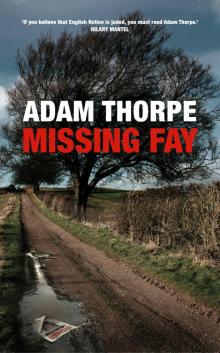 Missing Fay
Missing Fay Hodd
Hodd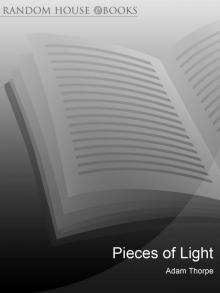 Pieces of Light
Pieces of Light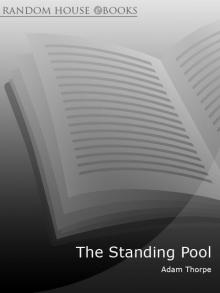 The Standing Pool
The Standing Pool Ulverton
Ulverton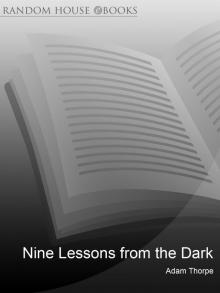 Nine Lessons From the Dark
Nine Lessons From the Dark Flight
Flight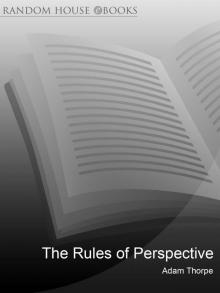 The Rules of Perspective
The Rules of Perspective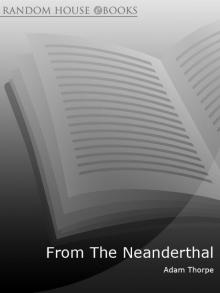 From the Neanderthal
From the Neanderthal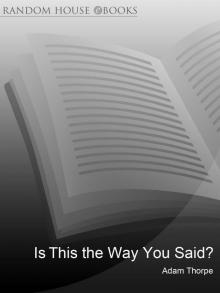 Is This the Way You Said?
Is This the Way You Said?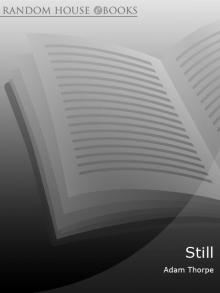 Still
Still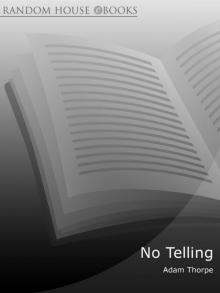 No Telling
No Telling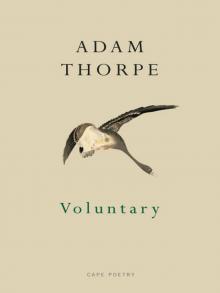 Voluntary
Voluntary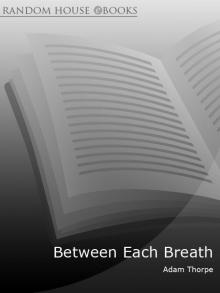 Between Each Breath
Between Each Breath